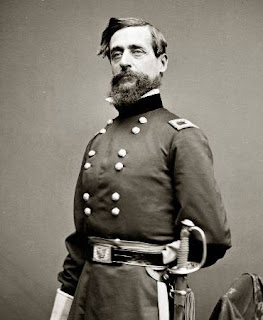I’m also almost finished watching Apple TV’s Masters of the Air. One piece of this series that has struck me is when the bombing crews returned from their missions and landed in England, the uninjured survivors are quickly whisked away in trucks for a debrief to sort out intelligence, create casualty reports, note the location of where certain bombers went down, and what happened during their raid. It was all a regimented and organized process.
It is hard for me to imagine what that process was like–trying to sort out what happened when you’re still in the process of figuring it all out with intelligence officers asking you questions and looking for answers you might not be able to provide.
The same process was done in the Civil War, though in a much less formal fashion. Soldiers often had to sort out the losses of a battle and its circumstances in their messes or companies. To some of their comrades, they did not know what happened–if they were alive or dead.
Sergeant James A. Wright of the 1st Minnesota said of the Battle of Antietam: “Such a clash of arms as occurred at Antietam is but feebly represented as a big train wreck, followed by an explosion and fire, and supplemented by a cyclone with a cloud-burst and a wash-out.” This sentence sums up the chaos and destruction of that one, bloody day.
Wright thankfully left us with a detailed description of the night after the battle and the feelings of those who lived through it unscathed, at least on the outside. It is worth reproducing most of his memoir of that night here:
When the fighting had subsided to a degree that further serious movements were not expected, preparations for the night and any emergency of the morning were made…
It is not to the dead and wounded alone that all of the suffering of the day has come. Is there not something to be said for those who have escaped the casualty list but have shared in all of the movements and dangers of the day and have had a “fighting edge” on for the last 18 or 20 hours? Coffee, crackers, and pork before two o’clock that morning is all they have eaten in 24 hours–except a cracker, perhaps while lying in line. Corps, divisions, brigades, regiments, and companies have been shattered in the struggles–as a tree may be riven by lightning–and suffered a loss of from a fifth to one-half of their numbers. Broken in organization, despoiled of their leaders, and diminished in numbers.
Now that the crisis for the day was over and darkness veiled our movements, there was reaction from the tremendous mental strain, and defrauded physical nature demanded relief. The rolls were called and inquiries made about the missing ones–as to time, place, and by whom they were last seen–and what their condition was. It is in this way the losses of a day’s fighting are estimated and reports are made. Then–unless it is certain they are already cared for or are in the hands of the enemy–interested comrades try to find and relieve them.
In preparation for tomorrow, we must rest, refill our cartridge boxes and stomachs. We had gone into action with 60 rounds–40 in our boxes and 20 in our pockets–and used from 40 to 50 each. Dispositions were made for the night, and ammunition was brought up and distributed. Fires were lit in sheltered places a little to the rear, and coffee made in our tin cups. Then–sitting on the ground where we intended to sleep, talking briefly of the events of the day, and trying to understand them–we ate crackers and pork from our haversacks and drank our coffee–hot, strong, and lots of it. The day had seemed warm, but now that night had come, it felt chilly and there was a threat of rain. But for the hot coffee we would have felt the cold as we wrapped ourselves in such coverings as we had with us and slept in line of battle with our equipments on and our rifles beside us.
For some hours we slept undisturbed, then were awakened, told that it was morning (though it was yet dark), and formed in line ready for action. We awoke chilled, for the morning was cool; everything was wet with a heavy dew; and it was the reverse of pleasant to await the coming of daylight and–we knew not what–but expected fighting.

